Epidemiologist: At This Rate, Vaccination Goal Won't Be Met Until Autumn
February 9, 2021 – In a Croatian media TV interview, epidemiologist of the Croatian Institute of Public Health Bernard Kaić yesterday said the plan to vaccinate half of the population by the summer will be delayed. He predicted that if Croatia continues vaccination at its current rate, the goal would not be reached until autumn, possibly late autumn
Epidemiologist of the Croatian Institute of Public Health Bernard Kaić, speaking to Croatian media RTL, told them the plan to vaccinate half of the population by the summer will be delayed. The epidemiologist predicted that if Croatia continues vaccination at its current rate, the goal of vaccinating half of the population within the country will not be completed until autumn, possibly late autumn.
"I can't say (by) exactly how much,” he told RTL, regarding how much delay will occur, “because we still don't know how many vaccines we'll get in March. And (how much) after March we (still) have no idea.”
“If this pace continues, it would take four million doses to vaccinate half the population. We won't achieve that until autumn for sure, and it’s late autumn,” the epidemiologist said.
According to an article in Index, the epidemiologist said that, as things currently stand, there will be three vaccines used in Croatia - AstraZeneca, Moderna and Pfizer / BioNTech. They will be used concurrently, with vaccinations from all three available in Croatia at the same time.
When asked which vaccine he would choose to be vaccinated with, the epidemiologist answered that he did not know and that he was glad that he did not have the opportunity to choose. "There was only one offered so I got vaccinated,” said the epidemiologist. “It would be really hard to decide."
When asked why some states have given up vaccinating those over the age of 65 with the AstraZeneca vaccine, the epidemiologist explained that in currently available results from clinical studies the messenger RNA vaccine had proven to be somewhat more effective in preventing mild forms of Coronavirus than the AstraZeneca vaccine. Some of the vaccines work in different ways. However, the epidemiologist ultimately said that it was expected the AstraZeneca vaccine would prove to be effective, it was just that this had not yet been proven statistically.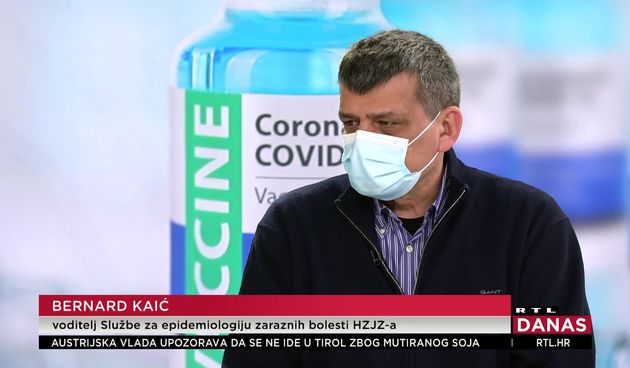 RTL screenshot
RTL screenshot
Later in the interview, the epidemiologist was asked “Due to skepticism towards AstraZeneca, many associations in (Croatia's) border areas plan to take pensioners to Serbia for vaccination. How smart is it to accept such an arrangement?”
The epidemiologist replied; “My only fear is that such organized trips do not turn into corona-trips so that people do not get infected on the way back and forth and do themselves harm. I would wait.”
The three vaccines for which Croatia is currently expecting deliveries are now not the only vaccines available. Speaking in a discussion on the same evening on another Croatian media outlet, HRT, Zlatko Trobonjača, an immunologist from the Rijeka Clinical Hospital, spoke about the Russian vaccine.
"Our country is obviously following the EU and its decisions,” he said. “The EU has entered into talks with Russia. It can be expected that these talks will continue. It is a quality vaccine, it provides high protection.”
"As for the quality of the vaccine, we can see that it is not harmful and it could be used in our country. The EU is oriented towards Western companies. And now, they (the companies) did not stick to the agreement," Trobonjača said, adding that he would be vaccinated with the first vaccine that was made available to him.
Jutarnji List: Croatian Cafes Open on Monday 15 February (and Gyms too)?
February 2, 2021 – The wait is over! In less than two weeks, Croatian cafes and gyms will open, if infection numbers continue on their current downward trajectory
With the spring season just around the corner, people will soon be able to once again enjoy coffee on the sun-filled daytime terraces of Croatian cafes. If Coronavirus infection numbers continue on their current downward trajectory, Croatian cafes and gyms will open on Monday 15 February. All businesses will still have to operate under strict epidemiological measures.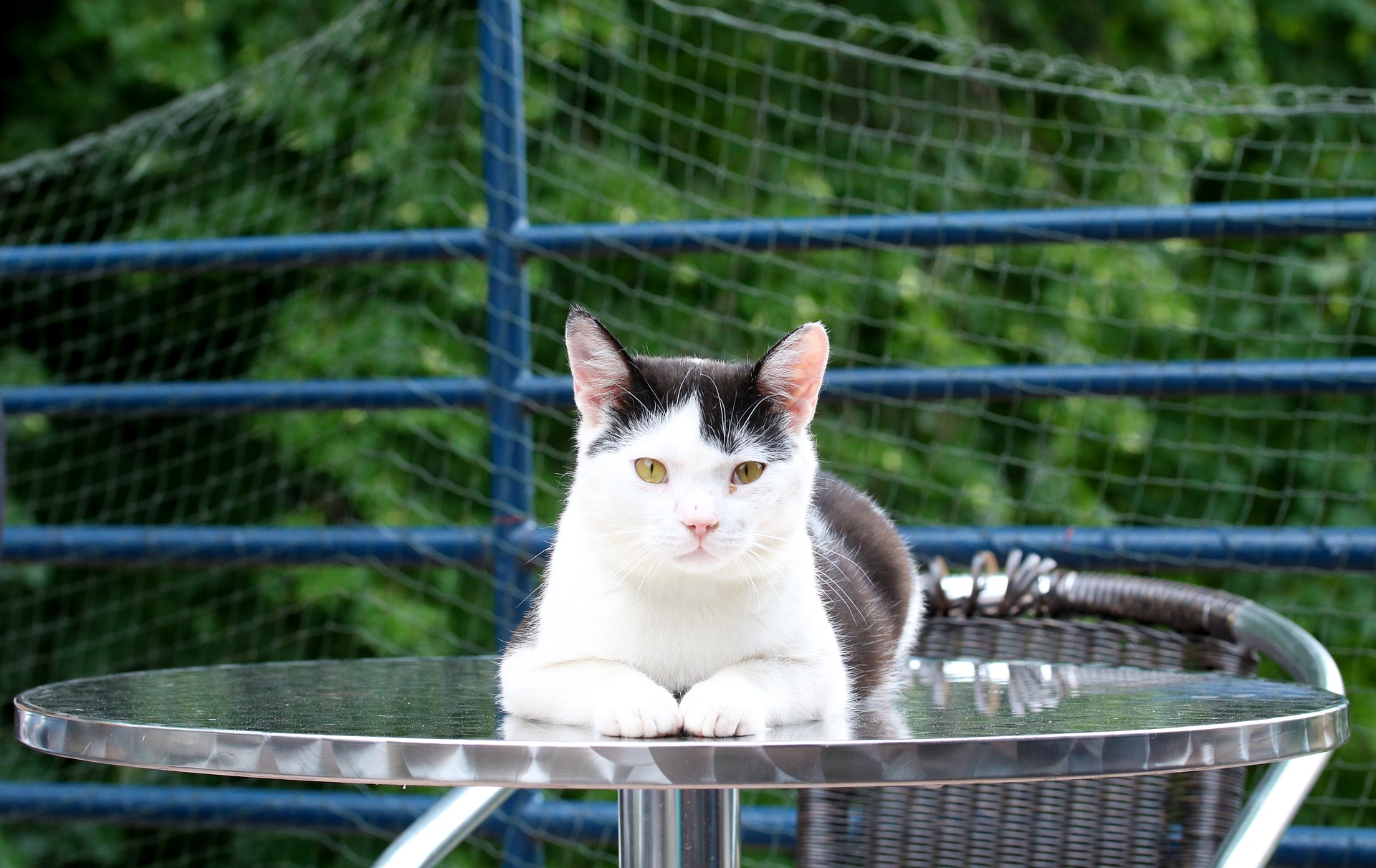
Deputy Prime Minister and the Chief of Staff, Davor Božinović, spoke about the forthcoming concessions on Croatian cafes and gyms, but a fuller picture of how the concessions will actually look was discovered unofficially by Croatian daily Jutarnji List. It was published in the evening of Monday 1st February 2021. The good news soon travelled across Croatia. It will come as a great relief to many independent business owners who have not been allowed to operate.
Business owners have been increasingly on edge over recent weeks, with protest openings of Croatian cafes and gyms threatened to take place in defiance of the current ban on operations (indeed, some did). Owners of Croatian cafes were particularly irked by the seeming inconsistencies in current measures – fast food outlets, gas service stations and bakeries were all permitted to sell coffee to go. People took advantage of this and thereafter congregated on the streets outside such businesses to enjoy their drinks. But, Croatian cafes were still not permitted to service people wishing to drink on outside terraces in almost exactly the same manner.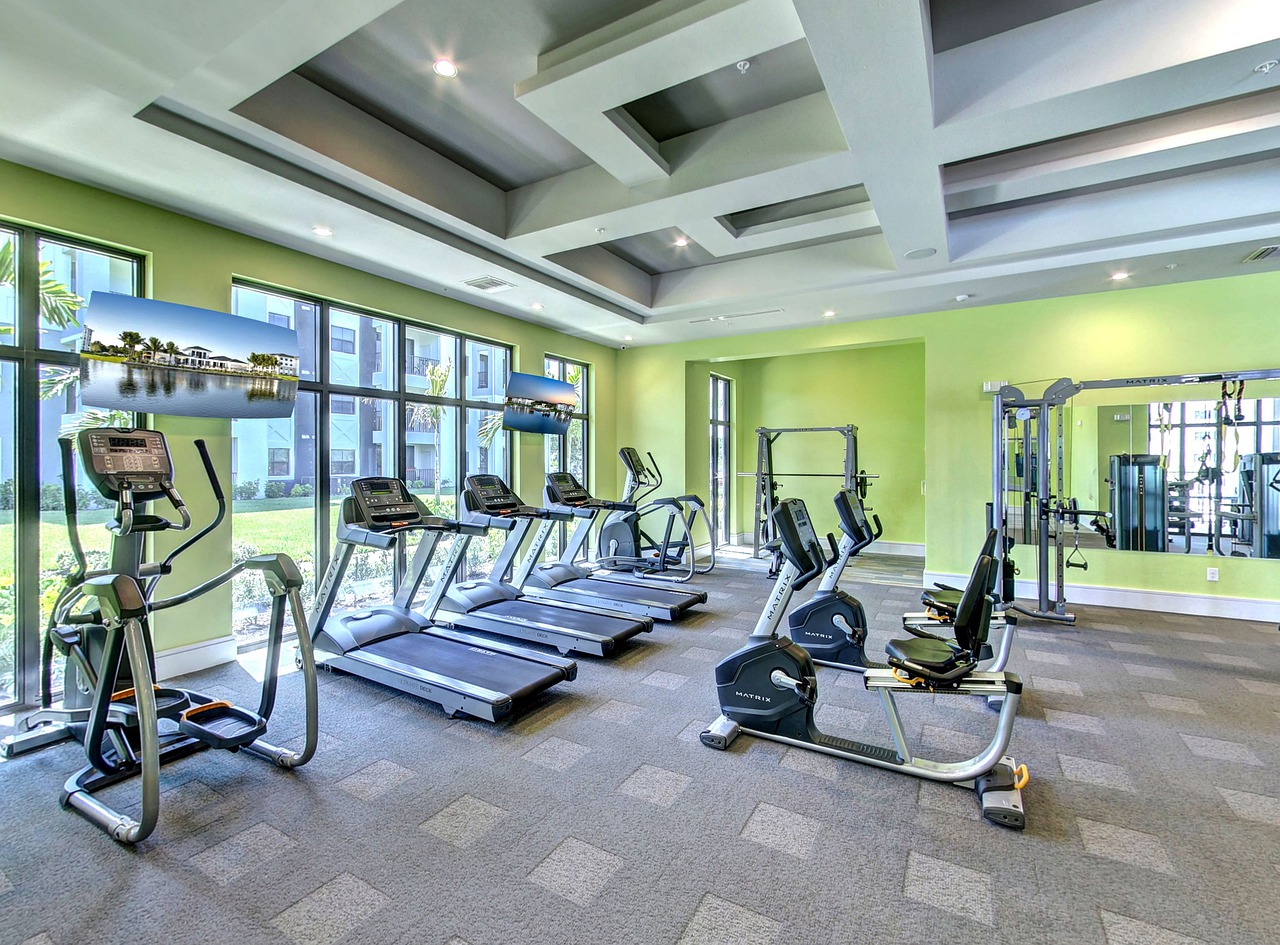
Monday 15 February has long been announced as the next review date for the imposed Coronavirus measures. But, until now, nobody was certain in which way – if any – measures would be relaxed.
Under unofficial plans, from Monday 15 February Croatian cafes will be able to serve coffee and drinks to be consumed on outside terraces, with strict epidemiological guidelines in place.
Croatian cafes and gyms opening on 15 February will be conditional on a continued downturn in infection numbers and the absence of new Coronavirus strains appearing in Croatia
The re-opening of Croatian cafes and gyms is wholly dependent not only on the continuing downturn in numbers of infected but also on the condition that new strains of Coronavirus - specifically those first detected in the UK and South Africa - do not appear in Croatia between now and then.
"If the indicators are good, if the numbers go down, we will certainly not be reluctant to react,” Deputy Prime Minister Davor Božinović said, regarding the 15 February review, “our aim to strike a balance between everything - with an emphasis on health care - has brought us to a position where Croatia has the least stringent measures in the EU."
Coronavirus infection numbers in some other European territories remain at an alarmingly high rate, although a corresponding relaxation in measures for some regions of Italy was similarly announced over recent days. This is the second time since the start of the pandemic that stricter measures imposed by the Croatian government – and a widespread public observance of these measures and other guidelines - have successfully produced the intended results.
Zagreb Cafes Protest Opening 1st Feb Cancelled, Fines Too Severe
January 31, 2021 – The planned cafes protest in Zagreb and elsewhere, which was due to see 100 facilities open their doors on Monday 1st February in defiance of the current ban on their operations, has been cancelled. Huge fines and the threat of prison are the reason for the climb down. Minister of Economy and Sustainable Development Tomislav Coric appealed to caterers for patience.
The proposed Zagreb cafes protest organised for Monday 1st February has been cancelled. The protest was due to see some catering facilities and gyms open their doors to the public in defiance of the current nationwide ban on operations in such facilities. Around 100 businesses were said to be joining the Zagreb cafes protest.
"Although it has been rumoured that more than 100 caterers in Zagreb will open their facilities on February 1, mostly cafes, or at least start issuing coffee and drinks outside, despite the work ban, it does not seem this will (now) happen, as many have withdrawn after seeing all the consequences that could befall them if they do, " Franz Letica, president of the Zagreb Caterers' Association, told Hina by telephone after the meeting.
On Friday 29 January, the Association of Caterers in Zagreb announced the opening of at least 100 bars and Croatian cafes would open on Monday. An informal meeting of caterers, many who were due to take part in the cafes protest, took place on the afternoon of Saturday 30 January. It seems that at the meeting, plans for the cafes protest fell apart. Caterers had faced the possible punishment of fines - from 20 thousand kuna to 70 thousand kuna - and up to three years in prison for defying the law and opening during the cafes protest.
Petra Odobašić, the owner of a catering facility from Zagreb who attended Saturday's informal meeting, also confirmed to Hina there would be no mass opening on Monday, but that only a dozen caterers would continue with the cafes protest. This handful of establishments were described as being situated mostly in the Dubrava area of Zagreb. Around 80 caterers attended Saturday's informal meeting, mostly from Zagreb, but some from other areas such as Karlovac.
Appearing on Croatian television on Saturday 30 January, Minister of Economy and Sustainable Development Tomislav Coric appealed to caterers for patience.
"We hope there will be (patience)," he said when asked about the proposed act of defiance, "given that we have explained the epidemiological situation we are currently in. We need to think about the season - spring and summer - this will be the time when we can all reap the fruits of responsibility together."
Hercegovac Begs Cro PM 'Open Borders So I Can Send My Wife To Her Mother'
January 29, 2021 – Lockdown is apparently taking a toll on one Hercegovac. The man from Široki Brijeg wrote to Croatian Prime Minister Andrej Plenković and begged him to reopen the borders between Croatia and Herzegovina so he could eject his wife from the family home for a month and send her to his mother-in-law's
The message from Hercegovac Ante Zovko (Ante Marinkov) was reposted on the Facebook page Imocki crnjaci where it picked up some 3 thousand likes in less than 6 hours.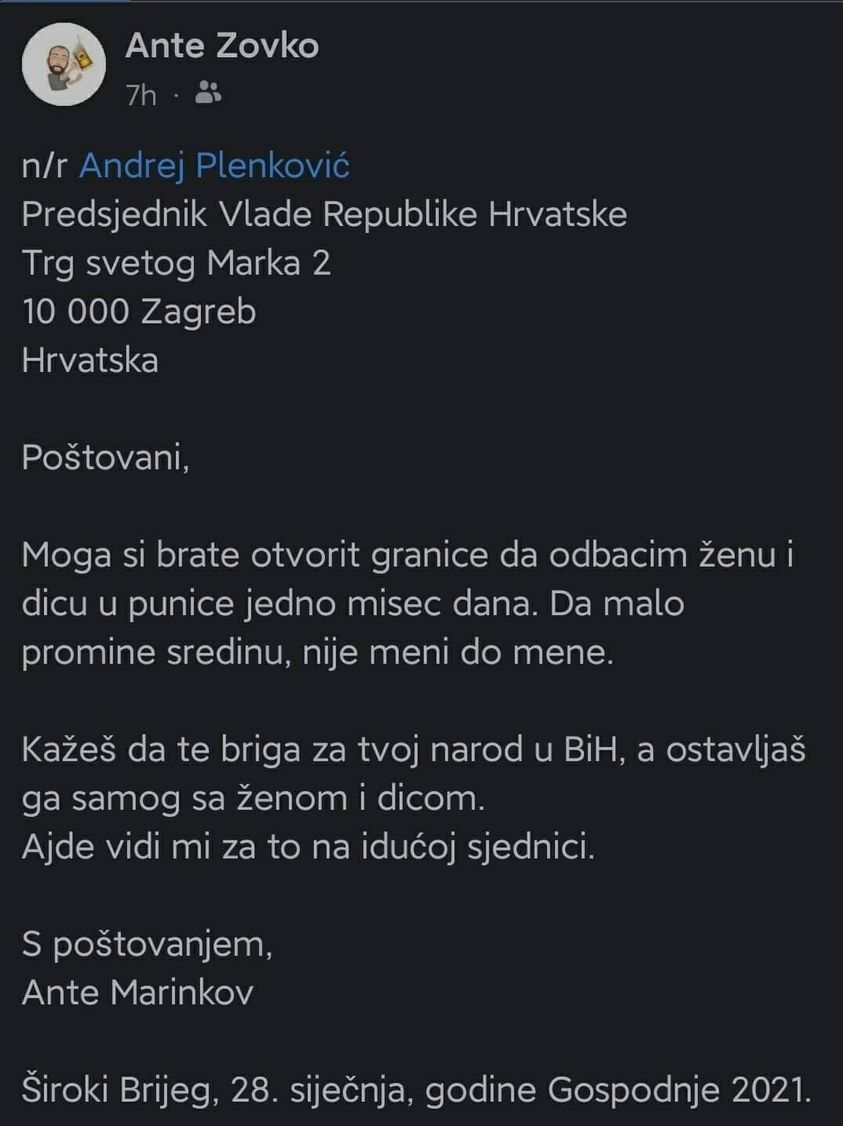
The town, Široki Brijeg, where this particular Hercegovac (a man from Herzegovina) lives is just 35 kilometres from the border with Croatia. Lots of Croatians live in this area, including this Hercegovac, his wife and his child. But not, it would seem, his wife's mother, who apparently lives in Croatia.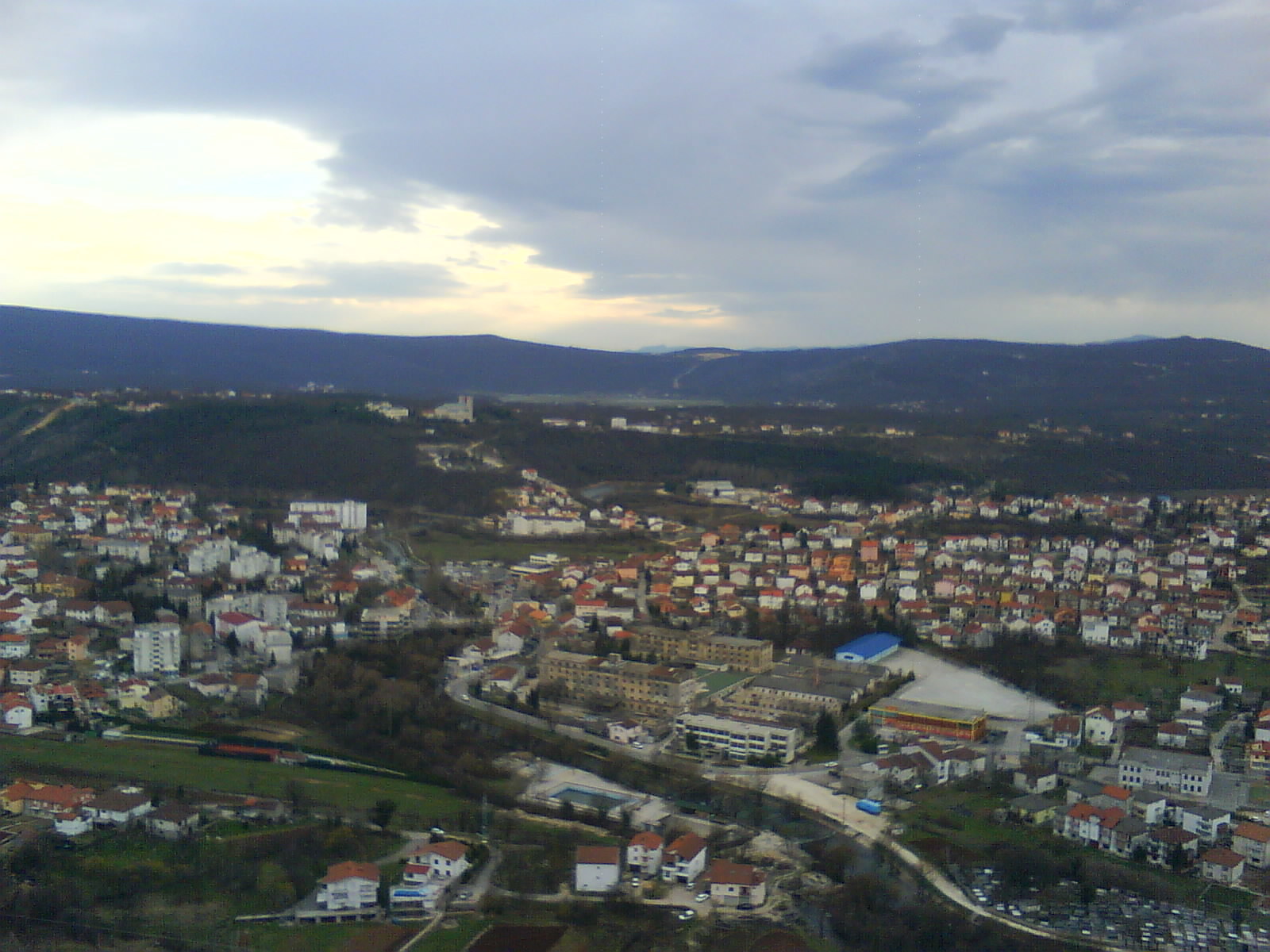 Široki Brijeg in Herzegovina, around 35 kilometres across the border from Croatia © Anto (talk)
Široki Brijeg in Herzegovina, around 35 kilometres across the border from Croatia © Anto (talk)
The Hercegovac's reason for wishing to eject his wife and child for a month was to change up the atmosphere for a time. One presumes he was not being entirely serious with his request.
The Hercegovac is not the first man to seemingly reach the end of his tether while restricted to staying in the family home. In April 2020, after just one month of being housebound, a man from a village near Osijek in Slavonia left his wife in the family home and went to live nearby in a tent.
Speaking anonymously at the time, the man's neighbour told the local SiB.hr news portal the couple have been happily married for 30 years. But, it seems the pressure of being around each other so closely during the lockdown was too much even for their strong union.
The neighbour was happy to report that since his friend pitched his tent in the nearby locale, relations between the man and his wife had actually returned to their usual levels of warmth and friendliness. The wife even came regularly to visit her husband in his tent. © John Waring
© John Waring
"My neighbour has been in his tent for a few days now,” he told the portal back in April. “He puts up a table and chairs in front. Occasionally our other neighbour comes over to drink some rakija (with him). I visited him too.”
The neighbour said his friend had quit the family home due to boredom more than anything else. Even after being happily married for 30 years, being around each other 24 hours a day was apparently just too much.
Perhaps in this more chivalrous response from the Slavonian man, Hercegovac Ante Marinkov could take some inspiration? After all, it's surely easier if one person departs from his family home in order to change the atmosphere than if two are forced to leave. Ante should find a nice spot in the fields nearby – not too close – and simply pitch up a tent. Problem solved! If he's lucky, his wife might come to visit bringing rakija.
VIDEO: Prohibition-Era Nightclubbing Zagreb, 33 Fined
January 29, 2021 – It has all the ingredients of a movie about Al Capone or Lucky Luciano in 1920s Chicago - illicit, hidden drinking dens, dancing girls, bullets, guns, gangsters and a police raid, only with a neon lighting scheme that remains fashionable strictly in Balkan clubs. Welcome to Prohibition-era nightclubbing Zagreb
It has all the ingredients of a movie about Al Capone (main picture) or Lucky Luciano in 1920s Chicago - illicit, hidden drinking dens, dancing girls, bullets, guns, gangsters and a police raid, only with a neon lighting scheme that remains fashionable strictly in Balkan clubs. Welcome to Prohibition-era nightclubbing Zagreb.
Croatian police have issued a video of a raid they undertook to shut down a Prohibition-era nightclubbing party in Zagreb. Inside the venue, they found 33 persons. None were wearing masks.
One young man at the party was caught with a pistol and bullets. If it weren't for the police's modern helmets with visors and the Balkan-cool neon lighting, you could be forgiven for thinking you were watching Eliot Ness and The Untouchables busting an illegal speakeasy. All cafes, restaurants, bars and nightclubs are supposed to be closed at the moment under measures adopted to counter the spread of Coronavirus.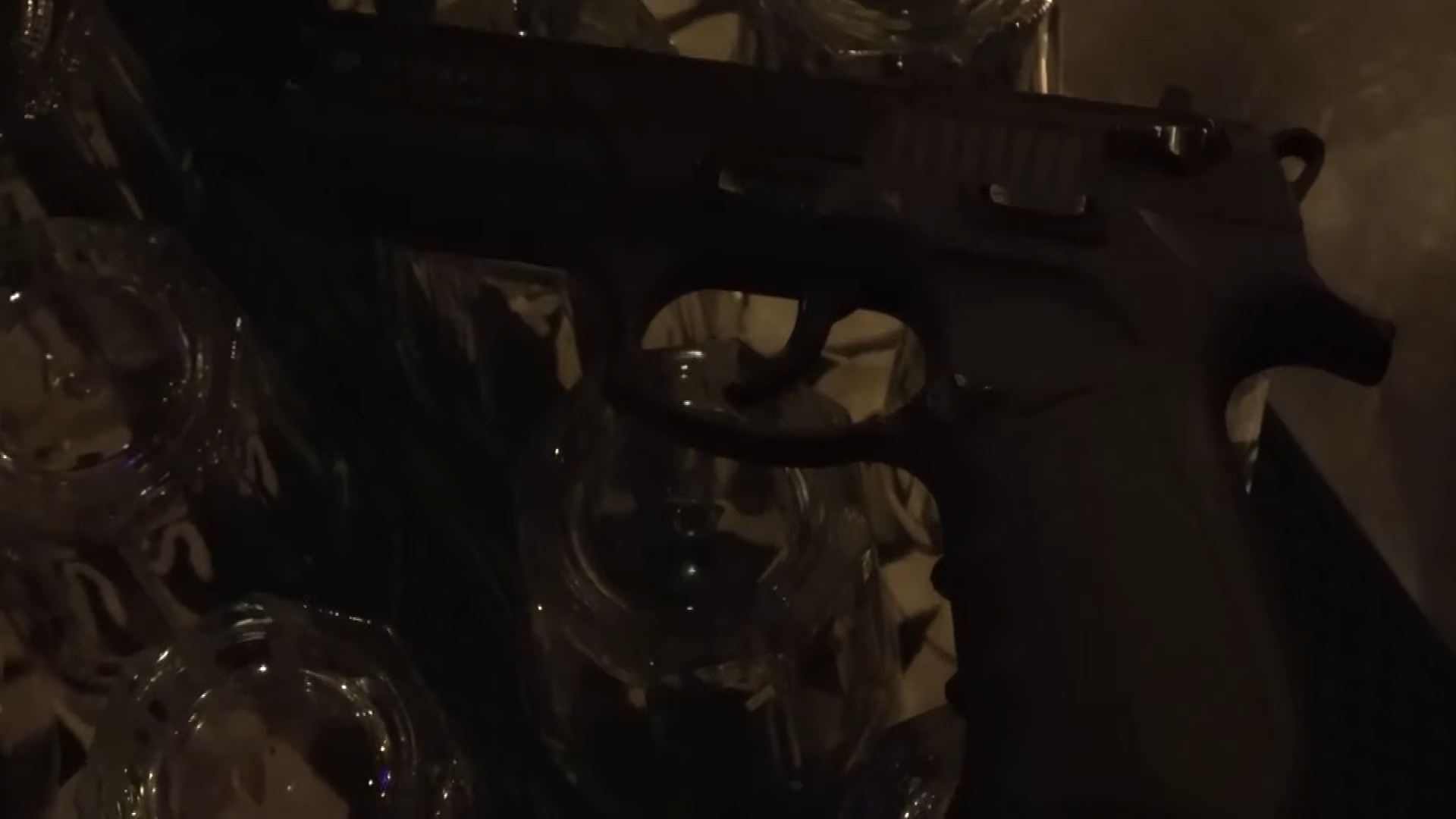 The pistol found by police while conducting a search on a 24-year-old at the club - Youtube screenshot
The pistol found by police while conducting a search on a 24-year-old at the club - Youtube screenshot
In the original era of America's Prohibition, under which the production, import, transportation, and sale of alcoholic beverages was illegal, Al Capone ultimately received an 11-year prison sentence for tax evasion and Lucky Luciano was looking at 30 - 50 years until he struck a deal and agreed to be deported to Italy. Thankfully, there are no mafia murders connected to this tale of Prohibition-era nightclubbing in Zagreb.
In addition to the video, the police released a statement about the prohibition-era nightclubbing raid:
"During the operation, a total of 33 people were found, identified and checked in said facility. No coercive measures were used during the actions of the police officers. 33 people were found not wearing protective masks, which is why the police officers issued them three Notices of Misdemeanor and 30 fines were collected for violations of Article 47, paragraph 2, item 9 of the Law on the Protection of the Population from Infectious Diseases.
Furthermore, for one of the caught persons, a 24-year-old was searched and a gas pistol was found in his possession, for which he was issued a Mandatory Misdemeanor Order for the offence under Article 27, paragraph 2 of the Law on procurement and possession of weapons by citizens. Bullets found by the police at the prohibition-era nightclubbing scene in Zagreb
Bullets found by the police at the prohibition-era nightclubbing scene in Zagreb
Also, officials of the Directorate of Civil Protection found violations of epidemiological measures contrary to the Decision on necessary epidemiological measures restricting gatherings and introducing other necessary epidemiological measures and recommendations to prevent the transmission of Covid-19 through gatherings. Due to performing catering activities contrary to the decisions of the Civil Protection Headquarters, officials of the State Inspectorate, Tourist Inspection, Zagreb Regional Office found a violation of Article 9A of the Catering Act and issued an oral decision banning the work, and the facility was sealed for at least 30 days. Misdemeanor proceedings will be initiated against the legal and responsible person.
As part of the criminal investigation, the 45-year-old owner of a catering facility was taken to the official premises of the Zagreb Police Administration for a criminal investigation on suspicion of having committed the criminal offence of "Spreading and Transmitting an Infectious Disease" under Article 180. He will be handed over to the custody supervisor after the criminal investigation is completed”
Prohibition in the United States took place in a 13 year period between 1920 and 1933. It is highly unlikely that the bars and cafes of Zagreb will be asked to remain closed for such a length of time. This is not the first instance of Prohibition-era nightclubbing taking place irrespective of epidemiological guidelines in Zagreb. In late November 2020, Croatian media (including Juarnji List) widely reported on police raids that took place at two Zagreb venues, even though measures adopted in the fight against the pandemic were at that time more relaxed.
Bozinovic Announces New COVID-19 Measures for Shops in Croatia
December 9, 2020 - The National Civil Protection Headquarters held a press conference at 11 am on Wednesday. Interior Minister and Head of the Headquarters Davor Bozinovic announced new COVID-19 measures for shops in Croatia.
"Today is the 289th day since the virus appeared in Croatia. In the last 24 hours, we have 4520 new cases. The number of positive cases to date is 159,372. Since the beginning of the epidemic, 837,619 people have been tested. In the last 24 hours, we have 12,596 tests, which gives a positive percentage of 29.96. 2703 were hospitalized, and 377 were admitted. There are 277 patients on ventilators, which is 23 additional compared to yesterday. 268 people were released from hospitals. In the past 24 hours, we have 69 new fatalities, which gives a figure of 2367 deceased from the beginning," said the Headquarters, as reported by Index.hr.
Capak added: "Our weekly average has risen by 3.7% in the last week while we had a 17.4% increase last week, so this week our increase is less. Our incidence is still high; I'm talking about a 7-day incidence per 100 thousand people. At the moment, it is 582.1; the worst is in Međimurje and Varaždin with more than 1000," said Capak.
"When we look at the EU incidence scale, then we see that Croatia is in 26th place and only Luxembourg has a higher incidence. As for mortality, we are now 15th out of 27, and the rate is 547.8 per million people," Capak said. "As for the share of positives in testing, only two countries are worse than us."
"As we discussed on Monday in institutions dealing with COVID patients, today, we will emphasize the importance of caring for health professionals, whose experiences surpass all previous experiences badly. At KB Dubrava, there is permanent psychological and psychiatric care for all health professionals," said Health Minister Vili Beros.
"We are also trying to prevent the so-called burn out syndrome, and workshops and webinars with the idea of psychological help are organized. An active form of intervention has also been developed, where target groups are being helped in various ways, primarily by health professionals. I would not like to omit the efforts of the Croatian Psychological Chamber; they have established a network of emergency telephones and hired more than 150 psychologists who assist citizens," said Beros.
Questions from journalists followed
We still have week-to-week growth. What is the plan for further introducing measures? What are the new rules for shopping centers, and if this continues, what are the next steps?
"We discussed, in general, the criteria for strengthening or reducing measures. The direct answer is that on the 21st, we will consider which measures are appropriate; on the 21st, we will consider the situation. In case we get worse, of course, we will consider strengthening the measures. In all the measures we adopted about 10 days ago, there is a possibility that we further limit the number of gatherings and economic and social activities. Still, the 21st is the date when these measures cease to apply, and we amend the situation or the need to tighten measures," Capak said.
"As for the organization of shops and shopping centers, we have prepared a decision that is likely to be signed during the day and relates to the special organization of shops from this Saturday to January 10. In terms of this decision, stores and shopping malls are grouped according to the retail space's net area. The number of customers who can be in the store at the same time will be limited in such a way that in stores that have up to 10 square meters of retail space, there can be only one customer.
From 11 to 100 square meters, the maximum number of customers that can be in the store at the same time is determined so that there must be at least 10 square meters per customer. In spaces up to 200 square meters, there must be at least 12 square meters per customer. In shops up to 2000 square meters, there must be at least 16 square meters per customer, and for those larger than that, there must be at least 20 square meters per customer.
For shopping malls, the maximum number of customers will be determined to be at least 16 square meters for each customer. Stores and malls will need to make this clear at the entrance and strictly adhere to it. All stores are to take additional measures during the expected arrival of a larger number of customers so that more customers do not stay in the premises than allowed. For stores with more than 2,000 square meters and shopping measures, new measures are being introduced that include organized transportation of customers and the introduction of stewards who will prevent the entry of too many customers, obligations to remove or disable seating in common areas of shopping centers and remove or disable entertainment devices. The obligation to warn customers is also being introduced, and the competent civil protection service will have to be given information on the ventilation system," said Bozinovic.
"Representatives of stores will certainly do everything to ensure that these measures are respected, because if not, then there is the part concerning sanctions, which we are trying to avoid. It is in everyone’s interest here to engage to the maximum. And that figure determined by the size of the space is appropriate to the situation, not only epidemiological but also the average number of store entries during the epidemic. If citizens see that the queues are large, they may give up or go to another store. We cannot prescribe all life situations. This is a rational decision to keep such an important activity open," Bozinovic added.
"We will make this decision during the day; it will be valid until January 10, so we plan to keep stores and shopping centers open until then. This is now a special decision for stores, and we anticipate that they will work safely until January 10. No one can say whether there will be any sudden deterioration or improvement, but keeping in mind all the elements and assessments, we made this decision," Bozinovic concluded.
To read more about coronavirus in Croatia, follow TCN's dedicated page.
Capak Hints at Possible Shopping Center Closures in Croatia, Comments on Pfizer Vaccine
December 3, 2020 - In a morning television interview with N1, Croatian Public Health Institute director Krunoslav Capak hints at possible shopping center closures in Croatia.
Index.hr reports that the director of the Croatian Institute of Public Health, Krunoslav Capak, was a guest this morning on the N1 television program, where he spoke about COVID-19 measures in Croatia, among other things, like the Pfizer vaccine.
"As part of the joint procurement, the EU signed contracts with six manufacturers, later came the seventh. Pfizer was our third negotiator, we ordered a million doses. It should come as soon as the vaccine is registered. The European Agency will announce its decision no later than December 29," says Capak.
"We don't know at what time the other 125,000 doses will come. We'd better vaccinate 62,000 people and then re-vaccinate those 62,000 with another dose because it's under contract. Health workers who come into contact with patients are a priority," Capak says.
"We will get Oxford and AstraZeneca as a priority. According to the promises, we will get complete tranches in May and June, then we could vaccinate the entire population over the age of 18," he said.
"We manage to vaccinate very quickly; the flu in a week or two. I can vaccinate healthcare workers with a license, under the supervision of a doctor," he said.
Capak spoke about doing surveys for vaccinations in healthcare facilities.
"We have found that there are a lot of unknowns about vaccines and vaccinations. We will give all media a list of priorities and information on what will be done and how it will be done," he said.
Capak was asked about the measures.
"Our goal is to reduce contacts. You will admit that the situation is difficult for us. What can we do? We can increase testing, we do that, but we also have to reduce close contact because it spreads the virus. Cafes are closed to reduce contacts, because they spread the virus," he said.
What about shopping malls?
"As for them, we have determined measures to prevent the spread of the virus. Should they be closed or not? At the moment we have not brought it to the table, but it is possible to close shopping centers. Some European countries closed them," he said.
"As far as compliance with the measures is concerned, the Headquarters continuously appeals to the citizens to protect themselves and others. By adhering to the measures, we protect others and the vulnerable. There will be the possibility of fines for those who don't comply, and the law is in parliament," says Capak.
"The measures should be a balance between health care and the economy," Capak says.
“I think the measures are effective to reduce contact among citizens, to keep the numbers down,” he adds.
He says that if the situation worsens, the epidemiologists will propose additional measures. He also spoke about the direction of the new measures
"In the direction of further reducing contacts in public transport, in shopping malls, in shops..." he said.
When asked about churches, he said that a horizontal measure of 25 people had been passed.
"It is possible to correct that, it is not the same whether it is in the cathedral or the chapel. The government has made a decision and so far it is so," he said.
When asked who in Croatia deals with calculations and projection models, he said that a working group deals with governments, but he did not want to say who is in it, only that there are two people from the CNIPH included.
Regarding the exact number of deaths from COVID-19 in Croatia, Capak says that there are defined rules and that it is considered that those who are COVID-19 positive died from COVID-19 and there is no other clear cause of death.
He confirmed that autopsies are generally not performed, as is the WHO's instruction, but that only a few of those autopsies were performed when the court ordered it to determine the exact cause of death.
He said that those who died in homes for the elderly are also listed in the statistics, but when asked why only the deceased in hospitals are always written in the statistics published by the Headquarters daily, he said that he had to check.
To read more about coronavirus in Croatia, follow TCN's dedicated page.
Croatian Parliament Speaker Says Fines for Violating COVID-19 Measures in Croatia begin Saturday
December 2, 2020 - In an interview with RTL Danas, Croatian Parliament Speaker Gordan Jandrokovic spoke about the fines for violating COVID-19 measures in Croatia.
RTL Danas reports that the opposition is against the changes to the law because they believe that the government should have declared a state of emergency so that the law could be passed by a two-thirds majority.
"I do not agree with the opposition, everything is in accordance with the Constitution and the law. I believe that there is no need for a two-thirds majority. Everything is covered by Article 16. If the opposition thinks otherwise, let them ask the Constitutional Court to rule on constitutionality," Jandrokovic said, adding that the opposition only wants to put political pressure on the ruling party.
Jandrokovic revealed that the law on fines will be applied from Saturday.
"The plan is to vote on Friday, we have a majority and the text will be published in the Official Gazette that day. They will be in force from Saturday. The fines were passed because of a small number of people who don't follow the law. The vast majority of Croatian citizens already respect the measures that are necessary to curb the epidemic, and these measures are being adopted as an additional means to reduce the number of infected and dead," said Jandrokovic.
The bill stipulates that the implementation of supervision over the application of safety measures for the protection of the population from infectious diseases is also carried out by police officers, inspectors of state administration bodies responsible for civil protection, inspectors of the State Inspectorate, and inspectors of other state administration bodies.
A fine of HRK 10,000 to HRK 40,000 is prescribed for legal entities in case of non-compliance with measures prescribed by law, i.e., if they do not respect the ban or restriction of public events and gatherings and if they do not respect the ban or restriction of private gatherings. A fine of HRK 5,000 to 10,000 is prescribed for a responsible person in a legal entity, as well as a craftsperson and a natural person who performs other independent activities.
A fine of HRK 500 is in place for improperly wearing a mask, and a fine of up to 10,000 is in place for a house party. A natural person can be fined HRK 500 in case of non-compliance with the prescribed measures, i.e., the obligation to properly wear a face mask or medical mask. A fine of HRK 5,000 to 10,000 is prescribed for the owner of private property if they organize or allow a private gathering contrary to the provisions of the law.
Fines may be collected at the place where the offense was committed by a person authorized to supervise the implementation of safety measures to protect the population from infectious diseases.
To read more about coronavirus in Croatia, follow TCN's dedicated page.


